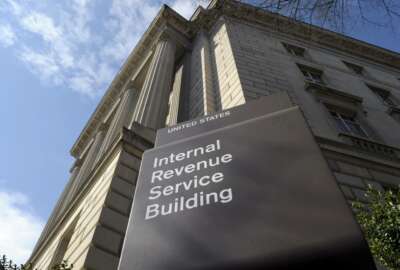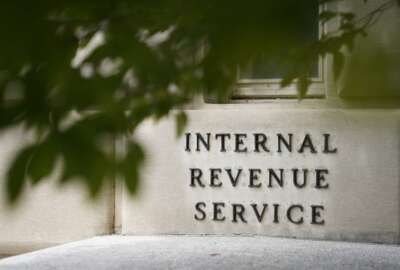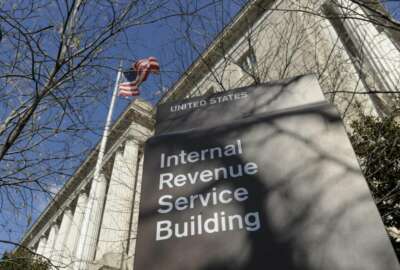

If the IRS gets all of the money Congress promised it over the next 10 years, its enforcement powers will grow, but taxpayers need some protection, as well.
Best listening experience is on Chrome, Firefox or Safari. Subscribe to Federal Drive’s daily audio interviews on Apple Podcasts or PodcastOne.
If the IRS gets all of the money Congress promised it over the next 10 years, its enforcement powers will grow a lot. My next guest argues protections for taxpayers should also get a plus up, he urges Congress to pass the Taxpayers Rights Bill. Dean Zerbe worked on the IRS restructuring committee in the late 90s. He’s an attorney working for tax whistleblowers, and he joined the Federal Drive with Tom Temin.
Interview transcript:
Tom Temin: There’s so much to appreciate it in that ’90s restructuring of the IRS that came in the wake of reports of bad service. And so it was a long process, but the IRS divided into the four pillars that it is made up of today, and that enforcement idea and how you do that correctly came up then. So what do you see happening now?
Dean Zerbe: Well, I think you’re right, they’re gonna get a good amount of funding. And they’ve got that in hand, and they’re gonna be able to hire a number of new folks. But I found that historically, for the service to maintain public support, Congressional support, you really want to balance, obviously you have to have an enforcement presence, but making certain that you’re providing good services, improving services for taxpayers, and at the same time protecting taxpayers rights, that you’re not just kind of grinding folks to grind. I think while people are comfortable with the idea of, ‘hey, there’s bad actors out there, let’s go get them’. For the folks that are in good faith trying to comply with the law. Let’s be respectful of their rights and kind of color within the lines in terms of it.
Tom Temin: The subtext here is there needs to be understanding that the tax code is so complex, that it’s nearly impossible not to violate it in some manner, if you have any level of complication in your return; corporate, small business or personal. And so the administration of real justice requires that understanding.
Dean Zerbe: That’s right, the code is incredibly complicated. And what we found on the restriction committee and from my time serving on the Finance Committee for Senator Grassley, that most folks really do want to comply, but they don’t understand the code, it’s not clear. So being able to get their phone, you know, to get their the phone call answer to get their CPA to be able to get good guidance, that’s really going to help a lot. A lot of people not complying with the law, obviously, you’ve got to have an enforcement presence, but just providing good services and being respectful taxpayers will really carry you a long ways. Most people, in fact, the vast majority of people voluntarily want to comply with their requirements under the tax code.
Tom Temin: And you’ve written recently that there should be maybe a companion bill to the bill that gave the IRS all of this money. Where would that originate? And what should be some of the provisions you feel it needs?
Dean Zerbe: So there’s been some bicameral legislation put out on taxpayer rights and taxpayer rights has had a long history of being a bipartisan provision. So I think they’re gonna have an end of year tax bill, I think that’d be a natural fit, it may go on and do another tax bill early in the year. But I think it’s something that both sides should should look at and realize that this is something that we can find common ground. And I think for Republicans, it’ll maybe address some of their concerns about the IRS having overreach. For the Democrats, I think they can look at it and say this is a way to ensure that we’re keeping the IRS his feet on the ground and maintaining public support. So I think a good example right now, if the IRS brings an action against the taxpayer, and really doesn’t have any grounds to do so, the taxpayer can recover his attorney fees or accounting fees. It’s very, very small. And it’s very limited. It’s kind of a very small limited benefit. And an easy one would just say yes, let’s make this more meaningful so that if a small or medium business owner is caught sideways, they can look at being compensated for their time and cost would be kind of an early example of something that I think you could find common agreement on.
Tom Temin: And as a former Hill staffer, now that you’re seeing as we speak, the Congress switching from sky blue, maybe to sky blue, pink, because it’s certainly not totally blue, totally red at all. Do you think this has a good chance of happening in the next session? Or two?
Dean Zerbe: I think it does. I think it’s right, it’s been very interesting to see the election results. If you start to think well, what can you get bipartisan support on? What can you get agreement on and I think taxpayer rights, taxpayer services, improving that, I think is something that you can find common ground and agreement on. I mean, you’ve always got to caution against overreach. But it’s traditionally been bipartisan. And I think you could get that through. I think there’s a lot of reports, one of the odd things about the taxpayer rights that are in the law already for instances, you have a right to go to court to protect them, but you’re not allowed to do it anonymously. So you can think about a time that you’re like, okay, the IRS did XYZ to me, but now I’m gonna have to air all my laundry out in court, You know, do I really want to do this? So I think that’s another example of a reform they can make that which is just common sense and they can get it so I do think there’s things they could do, right and I think Congress is going to be looking for, okay, what can we do in this new world of pink or light blue? What’s possible? And I think these are things that are possible.
Tom Temin: We’re speaking with Dean Zerbe, he is senior policy analyst at the National Whistleblower Center, and the managing director of the alliantgroup. And let’s talk about whistleblowers for a moment, because those have played a pretty big role in some of the celebrated cases where there’s real dollars, corporate level dollars at stake. What should happen there? I mean, what’s the status of it now? And what do you think could improve that whistleblower situation?
Dean Zerbe: Yes, that’s right. So the whistleblower is right. I’ve worked with them. And a good example is one of my clients, Brad Birkenfeld. He basically blew open the Swiss banks. I mean, we opened up Swiss banks, thanks to that one whistleblower. And they gave him a good award. And, and they should because he benefited, but the whistleblower program to the IRS’s credit, they really lost the thread a bit, but they brought in new leadership, a new director, John Hinman. I think they’re really trying to make the program work. Commissioner Rettig is very supportive of it too. Unfortunately, he’s leaving now. But I think they’re trying to get back on track. And it’s important to to support the whistleblower program, because one of the concerns folks have with a number of new IRS agents is they will kind of have an agent in every pod is a concern. And the whistleblower program is very, very good, much better than the normal IRS regime in terms of targeting the worst actors. So I think there’s a pretty strong consensus that those folks who are knowingly, willfully evading tax that they should get a knock on the door. And the whistleblower program is extremely good at identifying those worst actors and getting the folks who are really up to mischief. An area where there’s bipartisan support and bicameral support. Grassley and Wyden, in particular, to do some things to strengthen that program even further. But the whistleblower program, it’s kind of counterintuitive, but it’s a real benefit for honest taxpayers, because it basically directs the IRS’s audit resources after the worst actors and leaves alone the folks that are trying to get right with the Lord. So my hope is that it’s not really reached its full possibilities. But I think that with the new leadership coming in there that we’ll see some real expansion of that program for the benefit of everyone.
Tom Temin: Is the typical whistleblower, someone in a corporate setting that has knowledge, say in accounting or finance, that type of thing that sees what’s going by, and they’re just expected to shut up and do it.
Dean Zerbe: Yeah, it’s a good question, that’s exactly when the IRS thinks, who do they most want to hear from? That’s exactly what they really want to hear is from informed knowledgeable insiders, very common, it’ll be, say, the vice president of tax at a major entity who’s very knowledgeable, particularly in tax, they need someone who really understands what’s going on and what’s happening in the room. And that makes kind of for their perfect person is your knowledgeable, informed insider with with the ability to walk the IRS through kind of an ongoing or recent tax evasion, that gets them sitting up and very interested in what’s going on. So that’s very effective coming forward to the IRS.
Tom Temin: And one other question I had for you, rightly or wrongly, correctly, or incorrectly in a couple of administrations, now, the IRS has been seen or charged by some as being used politically. And this, of course, is would be death to the entire integrity of the system. If it came to pass in a widespread way. Should that be a priority for the next commissioner, I mean, commissioners are appointed by presidents. And yet you have an IRS that has to be fiercely and visibly independent of all politics.
Dean Zerbe: I think that’s a smart question. When I was working on the committee for Grassley, we would hear these concerns, and we took them very seriously. Because the integrity, the IRS has just got to be as good as it can possibly be. If you give people confidence in the system, and they’re not perfect, and things don’t always go the way we want to that doesn’t mean that bad things are happening. But you’ve got to be vigilant, you’ve got to give people confidence. You’ve got to be transparent and open at the IRS. And it’s also incumbent upon Congress, to also be doing its oversight to make sure that things are going right. The vast majority of the IRS folks are just trying to do their work, are dedicated individuals, and are trying to advance the the important work of the IRS. But for the commissioner, it’s vitally important that they be seen as leading an agency that is aboveboard, and doing the people’s work and without favor or foul against anybody. And so I think the outgoing commissioner has done basically a fine job on that. It’ll be incumbent on the new commissioner to similarly continue that going forward and give confidence to everybody and part of that is taking seriously claims. In other words, even claims that we thought maybe were a little bit outside of the norm. We still would follow them because we wanted to give confidence to people that we would take it seriously. We look at seriously and go through what they’re doing. So yes, I think that’s going to be something that will be an ongoing challenge for the IRS and the new commissioner.
Tom Temin:
Dean Zerbe is senior policy analyst at the National Whistleblower Center and the managing director of the alliantgroup.
Copyright © 2025 Federal News Network. All rights reserved. This website is not intended for users located within the European Economic Area.
Tom Temin is host of the Federal Drive and has been providing insight on federal technology and management issues for more than 30 years.
Follow @tteminWFED



